Unit 2 I'll help to clean up the city parks. SectionA (2a-2d)课件 +嵌入音频(共44张PPT)
文档属性
| 名称 | Unit 2 I'll help to clean up the city parks. SectionA (2a-2d)课件 +嵌入音频(共44张PPT) | 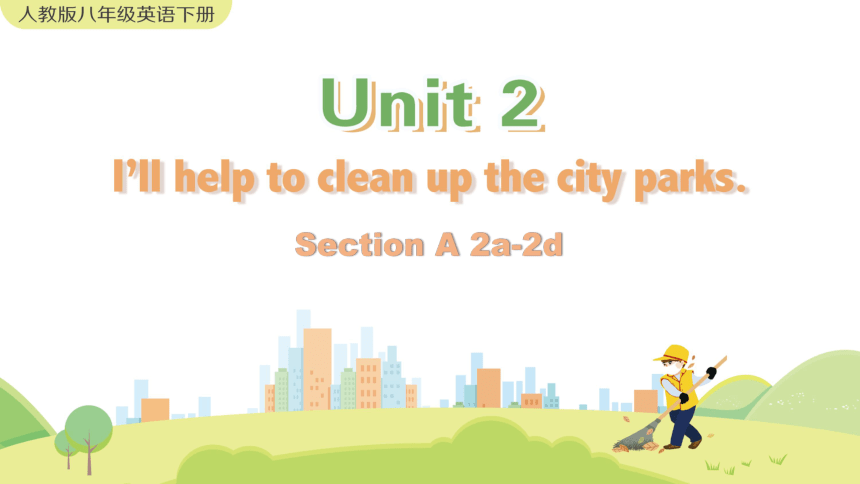 | |
| 格式 | pptx | ||
| 文件大小 | 8.5MB | ||
| 资源类型 | 教案 | ||
| 版本资源 | 人教新目标(Go for it)版 | ||
| 科目 | 英语 | ||
| 更新时间 | 2023-02-14 13:32:34 | ||
图片预览

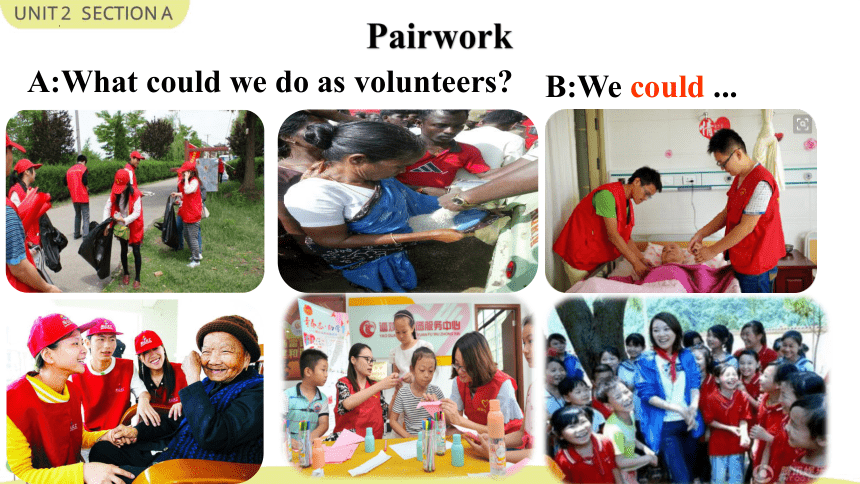

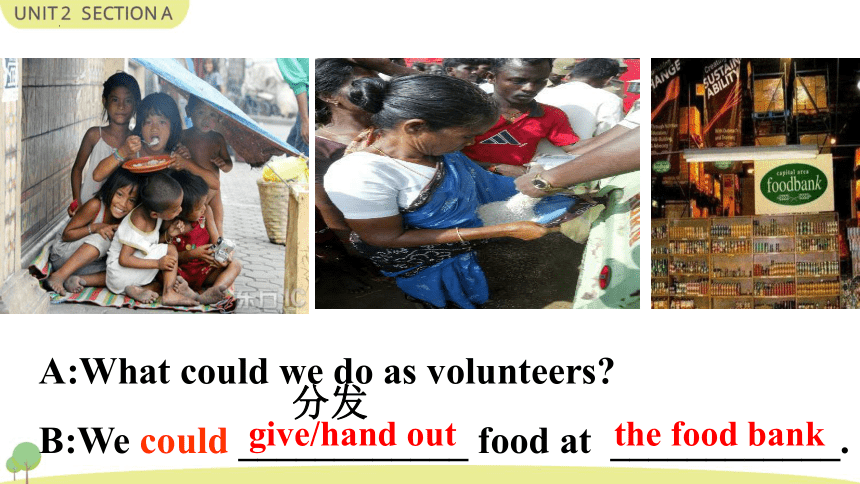
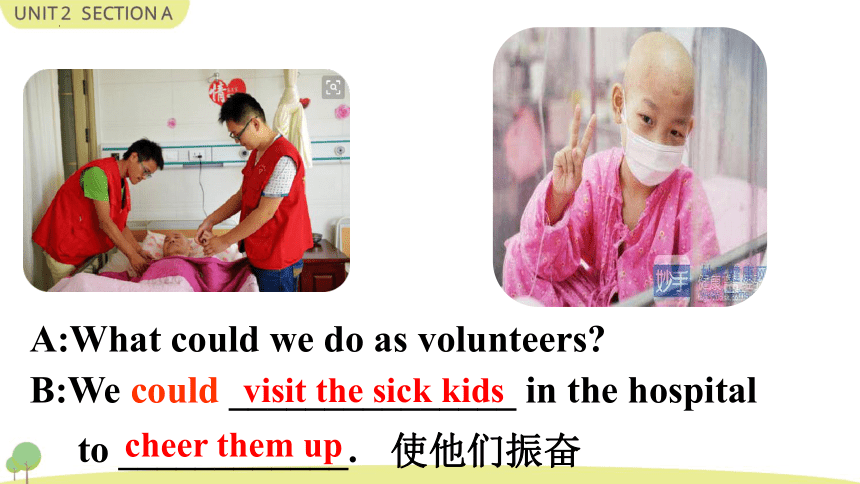
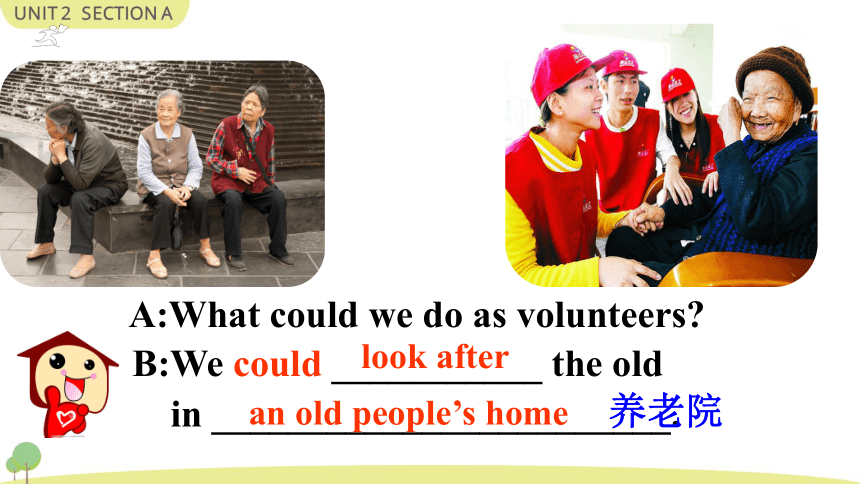
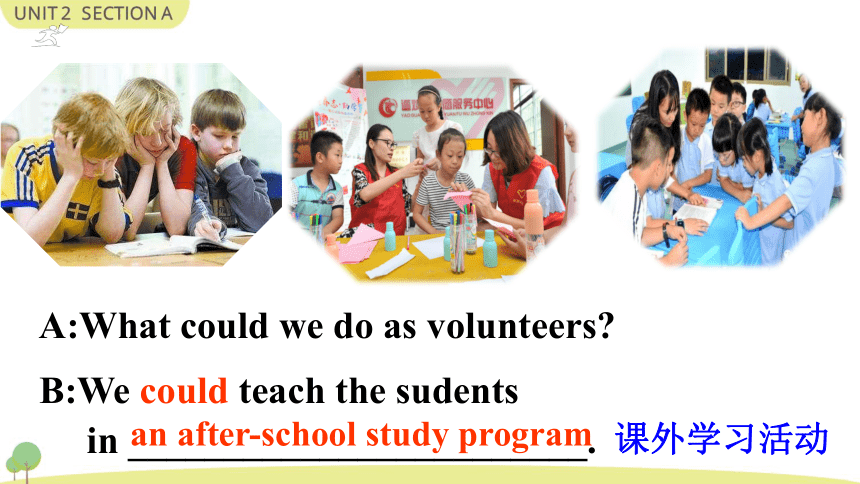
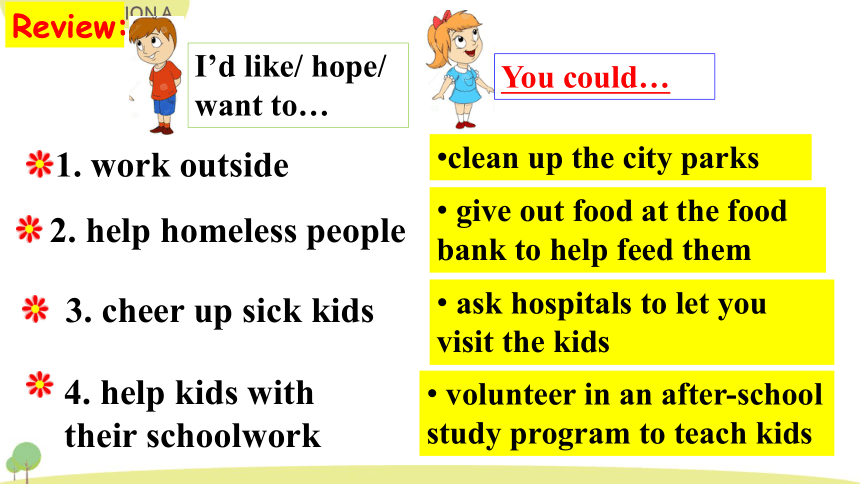
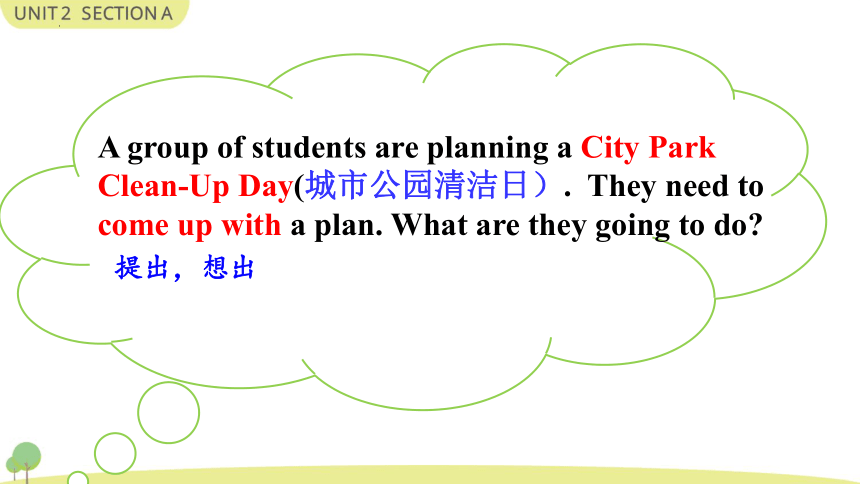
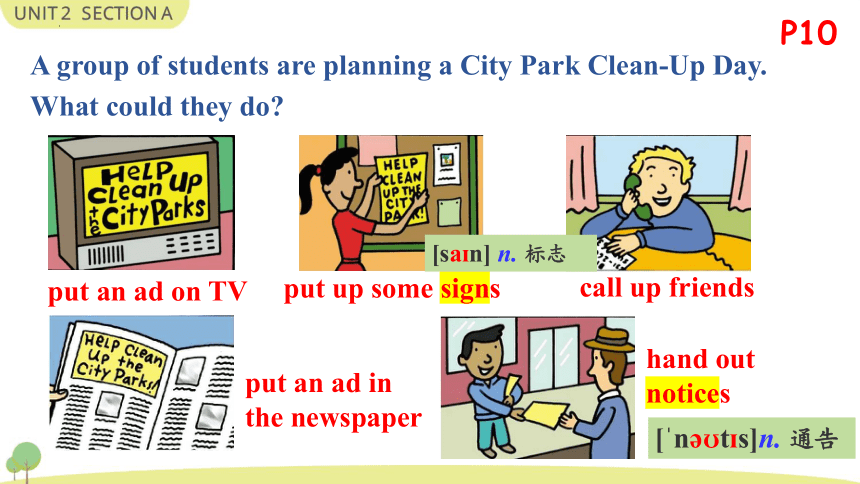
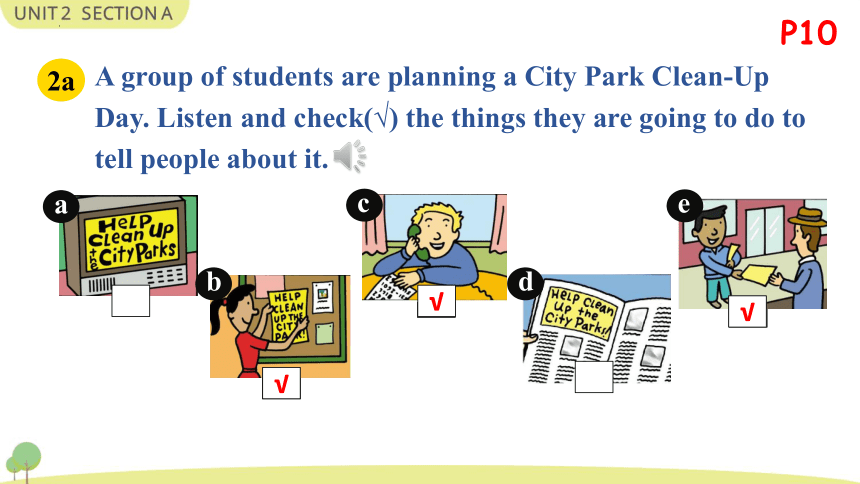
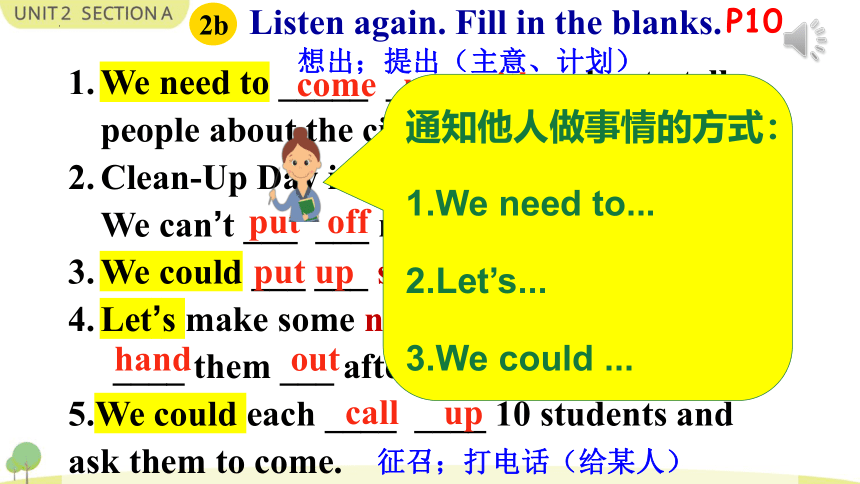
文档简介
(共44张PPT)
Section A 2a-2d
B:We could ...
A:What could we do as volunteers
Pairwork
B:We could _________the city parks.
A:What could we do as volunteers
clean up
城市公园
B:We could ____________ food at ____________.
A:What could we do as volunteers
the food bank
give/hand out
分发
B:We could _______________ in the hospital
to ____________.
How could we help people
A:What could we do as volunteers
visit the sick kids
cheer them up
使他们振奋
B:We could ___________ the old
in ________________________.
A:What could we do as volunteers
look after
an old people’s home
养老院
B:We could teach the sudents
in ________________________.
A:What could we do as volunteers
an after-school study program
课外学习活动
I’d like/ hope/ want to…
1. work outside
2. help homeless people
3. cheer up sick kids
4. help kids with their schoolwork
You could…
clean up the city parks
give out food at the food bank to help feed them
ask hospitals to let you visit the kids
volunteer in an after-school study program to teach kids
Review:
A group of students are planning a City Park Clean-Up Day(城市公园清洁日). They need to come up with a plan. What are they going to do
提出,想出
A group of students are planning a City Park Clean-Up Day.
What could they do
call up friends
put an ad on TV
hand out notices
put an ad in the newspaper
put up some signs
[sa n] n. 标志
[ n t s]n. 通告
P10
2a
A group of students are planning a City Park Clean-Up Day. Listen and check(√) the things they are going to do to tell people about it.
a
b
c
d
e
√
√
√
P10
We need to _____ ___ ____ a plan to tell people about the city park clean-up.
Clean-Up Day is only two weeks from now. We can’t ___ ___ making a plan.
We could ___ ___ signs.
Let’s make some notices, too. Then I’ll
____ them ___ after school.
5.We could each ____ ____ 10 students and ask them to come.
come up with
put off
put up
hand out
call up
Listen again. Fill in the blanks.
推迟 +Ving
想出;提出(主意、计划)
张贴
分发
征召;打电话(给某人)
通知他人做事情的方式:
1.We need to...
2.Let’s...
3.We could ...
2b
P10
come up with
put off
put up
hand out
write down
call up
to write something on the paper
to give many people something, usually on the street
to think up some ideas
to ask many people to do something
to make something done later
to put sth. on the wall
Do you know their meanings
2. We can’t put off making a plan. (教材P10 2b)
put off 通常指会议、活动等未能按预定的时间举行,后面可接名词、代词或动词-ing形式作宾语。
put off 推迟
Point
Language points
Would you mind if we put it off until tomorrow
【拓展延伸】 与put相关的短语还有:
put
put down 放下;
写下
put ... into 投入 (时间、心思等)
put out 熄灭
put away 把……放回原处
put on穿上;上演;体重增加
put up 张贴; 搭建; 举起
3. We could each call up 10 students and ask them to come. (教材P10 2b)
call up 打电话给(某人);征召
Point
Language points
Forgive me for calling you up so early please.
(1) call up在此处意为“打电话给(某人)”,是“动词+副词”型短语。
He was called up at the beginning of the war.
(2) call up还可意为“征召”。
call
call for要求;去接(某人)
call on sb. (短暂地)访问
call back 回电话
call in 召来;叫来
【拓展延伸】 含call的其他常见短语
Tapescripts
Boy 1: Now we need to come up with a plan to tell people
about the city park clean-up.
Girl 1: Yeah, but I’m hungry, Bob. Let’s have lunch first.
Girl 2: No, we need to start now. Clean-up Day is only two
weeks from now.
Boy 2: You’re right, Sally. We can’t put off making a plan.
As we talk, I’ll write down all our ideas. Then we
can decide which ideas are best.
提出;想出
推迟
写下
Girl 1: Um…well…we could put up signs.
Boy 2: That’s a good idea!
Girl 2: Let’s make some notices, too. Then I’ll hand
them out after school.
Boy 1: OK. Great! And we could each call up 10
students and ask them to come.
Boy 2: Hey, we’re coming up with a lot of good ideas,
aren’t we
张贴
分发
打电话给某人;征召
2c
Make a conversation using the information in 2a and 2b.
A: We need to come up with a plan for the City Park Clean-Up
Day.
B: Let’s have lunch first.
A: No, we need to start now. Clean-Up Day is only two weeks
from now.
Have you ever worked in an old people’s home
What can we do at an old people’s home
养老院
read the newspaper to the old people
talk to/with them
listen to them
dance for them
help them clean their rooms
write to their friends or family for them
We can
1. Where’s Helen going to work this summer
2. What is Helen doing
3. What did Tom do to help the old people
4. Why do Tom and Helen think that they should listen to and care for the old people
Read the conversation in 2d and answer the questions.
Helen: Hi, Tom. I’m making some plans to work in an old people's home this
summer.
Tom: Really I did that last summer!
Helen: Oh, what did they ask you to help out with
Tom: Mm... things like reading the newspaper to the old people, or just talking to
them. They told me stories about the past and how things used to be.
Helen: That sounds interesting.
Tom: Yeah, a lot of old people are lonely. We should listen to them and care for
them.
Helen: You're right. I mean, we're all going to be old one day, too.
Listen and read.
1. Where’s Helen going to work this summer
______________________________________
She’s going to work in an old people’s home.
2. What is Helen doing
______________________________________
______________________________________
She’s making some plans to work in an old people’s home this summer.
Read the conversation in 2d and answer the questions.
3. What did Tom do to help the old people
_____________________________________
_____________________________________
He read the newspaper and talked to the old people.
4. Why do Tom and Helen think that they should listen to and care for the old people
_____________________________________
_____________________________________
Because a lot of old people are lonely and we’re all going to be old one day, too.
Helen: Hi, Tom. I’m making some plans to work in an old people's home this
summer.
Tom: Really I did that last summer!
Helen: Oh, what did they ask you to help out with
Tom: Mm... things like reading the newspaper to the old people, or just talking to
them. They told me stories about the past and how things used to be.
Helen: That sounds interesting.
Tom: Yeah, a lot of old people are lonely. We should listen to them and care for
them.
Helen: You're right. I mean, we're all going to be old one day, too.
Listen and read.
help (sb.) out 分担……工作;帮一把;帮助(某人)摆脱困境
曾经……; 过去……
孤独的
照顾
make plans to do sth.
制定计划做某事
【甘肃武威中考】
Our city is cleaner than it ______ be.
A.is used to B.used to
C.uses to D.is used
【四川南充中考】
—Many young people usually offer their seats to
the old on the bus.
—That’s good. The old should be ____.
A. looked for B. listened to
C. depended on D. cared for
【湖南岳阳中考】
The government of China ____ the idea of A Belt
and A Road in 2013.
A. came up with B. cheered up C. put up
come up with
give out
put off doing sth.
put up signs
hand out
call sb. up
write down
make some plans
help out with
care for old people
1. 提出;想出
2. 分发;散发
3. 推迟做某事
4. 张贴标语
5. 分发
6. 给某人打电话
7. 写下
8. 制定一些计划
9. 帮助排忧解难
10. 照顾老年人
4. They tole me stories about the past and how things used to be. (教材P10 2d)
used to 表示过去一度存在或经常发生,但现在已经不存在的动作或状态。其后接动词原形,且不与表示过去的时间状语连用。used to的否定形式是didn’t use to或used not to(usedn’t to)。
used to 曾经……;过去……
Point
Post-listening
Language points
He used to be a teacher.
He didn’t use to wear glasses. = He usedn’t to wear glasses.
【拓展延伸】 be used to doing sth. 意为“习惯做某事”,to 在此处为介词。
Mario is used to volunteering at an animal hospital now.
5. ①Yeah, a lot of old people are lonely. (教材P10 2d)
②I want to travel alone. (教材P12 4c)
lonely adj. 孤独的;寂寞的 alone adv. 独自;单独
Point
Post-listening
Language points
lonely 形容词 意为“孤独的;寂寞的”,指情感上的孤独,带有伤感的色彩。(①句中用法) 意为“荒凉的;偏僻的”,通常用于名词前作定语 alone 副词 意为“独自;单独”,相当于by oneself。(②句中用法) 强调没有同伴的客观情况,不含感彩。
形容词 意为“单独的;独自的”,常用作表语。
Post-listening
The old man lives alone, but he doesn’t feel lonely.
At a dark night, a man came to a lonely village.
The boy was very shy, and he was alone all the time.
lonely 形容词 意为“孤独的;寂寞的”,指情感上的孤独,带有伤感的色彩。(①句中用法) 意为“荒凉的;偏僻的”,通常用于名词前作定语 alone 副词 意为“独自;单独”,相当于by oneself。(②句中用法) 强调没有同伴的客观情况,不含感彩。
形容词 意为“单独的;独自的”,常用作表语。 6. We should listen to them and care for them. (教材P10 2d)
care for 照顾;非常喜欢
Point
Post-listening
Language points
The mother cared for the sick child day and night.
(1) care for在此处意为“照顾”,相当于look after 或take care of。
He doesn’t care for classical music.
(2) care for还可意为“非常喜欢”,常与not连用。
care
care for照顾;非常喜欢
care about 关心;在意
take care当心;小心
take care of 照顾
【归纳总结】 与care相关的短语:
look out eat out
hand out break out
work out go out
小心
外出吃饭
分发
爆发
想出;解决
出去
(2) 与out相关的短语:
Exercises
一、单项选择
(天水中考) Don’t _____todays’ work for tomorrow. Today’s work must be done today.
A. put off B. put out C. put up D. put on
(岳阳中考)The goverment of China _____ the idea of the Belt and Road in 2013.
A. came up with B. cheered up C. put up
(宜宾中考) My sister _____ be lazy. But now she’s working really hard.
A. used to B. is used to C. was used to
A
A
A
1
2
3
Exercises
(常州中考)—Little Jenny looks unhappy today.
—Don’t worry. A box of chocolates will_____ her _____.
A. give;up B. wake;up C. cheer; up D. pick; up
(南充中考)—Do you think it is popular to_____ red envelopes(红包) on WeChat during festivals
—Yes. But I prefer giving gifts to family members.
A. give out B. give away C. give back D. give up
C
A
4
5
Exercises
房间太脏了,请打扫干净。
The room is too dirty. Please _____ _____ _____.
这位老人独自生活,但他从不感到孤独。
The old man lives _____ , but he never feels ______.
许多青少年关心老人,他们经常在公共汽车上给老人让座。
Many teenagers _____ _____ the old and they often offer their seats to them on buses.
clean it up
二、完成句子
1
2
3
care for
alone
lonely
一、单项选择。
He helps ____ the classroom.
A. cleans up B. cleaning up
C. clean up
Exercise
3. Let’s help ___ food at the food bank.
A. to give out B. give up C. giving out
2. I took her to the concert to ____.
A. cheer up her B. cheer her up
C. cheer she up
1. You’d better _____ ___ ____ (想出) a better plan.
2. Who will ________ ___ ______ (自愿回答) this
question
3. You could put up a ______ (布告) here.
二、根据中文提示完成句子。
come up with
volunteer to answer
notice
4. With no one to talk to. He _____ very ______
(感觉很孤独).
5. The life _____ ___ ___ (曾经是) very interesting
in my school days.
lonely
felt
used to be
根据句意及括号内的提示填空。
Exercise
1.Mary is telling an interesting story to ____________
(使高兴) her brother.
2. On weekends my younger sister _______(义务做工)
in an old people’s home.
3. Follow the road and you’ll see the ___(标志) for the park.
4. There were lots of ________(通知) on the notice
board (布告板).
5. I feel much _____(孤独的) here than I was in Beijing.
cheer up
volunteer
sign
notices
lonely
1. We have to put off _____ plans for the vacation.
A. make B. to make
C. making D. made
2. The teacher is giving ______ the new books to the students.
A. to B. out
C. away D. up
完成句子。
1. 我们昨天帮助打扫校园了。
We helped ______ ___ the school yard yesterday.
2. 最后,Mary想出了一个好办法。
Finally, Mary ______ ___ _____ a good idea.
3. David 正在制定留学计划。
David __ _______ __ ______ to study abroad.
clean up
came up with
is making a plan
Section A 2a-2d
B:We could ...
A:What could we do as volunteers
Pairwork
B:We could _________the city parks.
A:What could we do as volunteers
clean up
城市公园
B:We could ____________ food at ____________.
A:What could we do as volunteers
the food bank
give/hand out
分发
B:We could _______________ in the hospital
to ____________.
How could we help people
A:What could we do as volunteers
visit the sick kids
cheer them up
使他们振奋
B:We could ___________ the old
in ________________________.
A:What could we do as volunteers
look after
an old people’s home
养老院
B:We could teach the sudents
in ________________________.
A:What could we do as volunteers
an after-school study program
课外学习活动
I’d like/ hope/ want to…
1. work outside
2. help homeless people
3. cheer up sick kids
4. help kids with their schoolwork
You could…
clean up the city parks
give out food at the food bank to help feed them
ask hospitals to let you visit the kids
volunteer in an after-school study program to teach kids
Review:
A group of students are planning a City Park Clean-Up Day(城市公园清洁日). They need to come up with a plan. What are they going to do
提出,想出
A group of students are planning a City Park Clean-Up Day.
What could they do
call up friends
put an ad on TV
hand out notices
put an ad in the newspaper
put up some signs
[sa n] n. 标志
[ n t s]n. 通告
P10
2a
A group of students are planning a City Park Clean-Up Day. Listen and check(√) the things they are going to do to tell people about it.
a
b
c
d
e
√
√
√
P10
We need to _____ ___ ____ a plan to tell people about the city park clean-up.
Clean-Up Day is only two weeks from now. We can’t ___ ___ making a plan.
We could ___ ___ signs.
Let’s make some notices, too. Then I’ll
____ them ___ after school.
5.We could each ____ ____ 10 students and ask them to come.
come up with
put off
put up
hand out
call up
Listen again. Fill in the blanks.
推迟 +Ving
想出;提出(主意、计划)
张贴
分发
征召;打电话(给某人)
通知他人做事情的方式:
1.We need to...
2.Let’s...
3.We could ...
2b
P10
come up with
put off
put up
hand out
write down
call up
to write something on the paper
to give many people something, usually on the street
to think up some ideas
to ask many people to do something
to make something done later
to put sth. on the wall
Do you know their meanings
2. We can’t put off making a plan. (教材P10 2b)
put off 通常指会议、活动等未能按预定的时间举行,后面可接名词、代词或动词-ing形式作宾语。
put off 推迟
Point
Language points
Would you mind if we put it off until tomorrow
【拓展延伸】 与put相关的短语还有:
put
put down 放下;
写下
put ... into 投入 (时间、心思等)
put out 熄灭
put away 把……放回原处
put on穿上;上演;体重增加
put up 张贴; 搭建; 举起
3. We could each call up 10 students and ask them to come. (教材P10 2b)
call up 打电话给(某人);征召
Point
Language points
Forgive me for calling you up so early please.
(1) call up在此处意为“打电话给(某人)”,是“动词+副词”型短语。
He was called up at the beginning of the war.
(2) call up还可意为“征召”。
call
call for要求;去接(某人)
call on sb. (短暂地)访问
call back 回电话
call in 召来;叫来
【拓展延伸】 含call的其他常见短语
Tapescripts
Boy 1: Now we need to come up with a plan to tell people
about the city park clean-up.
Girl 1: Yeah, but I’m hungry, Bob. Let’s have lunch first.
Girl 2: No, we need to start now. Clean-up Day is only two
weeks from now.
Boy 2: You’re right, Sally. We can’t put off making a plan.
As we talk, I’ll write down all our ideas. Then we
can decide which ideas are best.
提出;想出
推迟
写下
Girl 1: Um…well…we could put up signs.
Boy 2: That’s a good idea!
Girl 2: Let’s make some notices, too. Then I’ll hand
them out after school.
Boy 1: OK. Great! And we could each call up 10
students and ask them to come.
Boy 2: Hey, we’re coming up with a lot of good ideas,
aren’t we
张贴
分发
打电话给某人;征召
2c
Make a conversation using the information in 2a and 2b.
A: We need to come up with a plan for the City Park Clean-Up
Day.
B: Let’s have lunch first.
A: No, we need to start now. Clean-Up Day is only two weeks
from now.
Have you ever worked in an old people’s home
What can we do at an old people’s home
养老院
read the newspaper to the old people
talk to/with them
listen to them
dance for them
help them clean their rooms
write to their friends or family for them
We can
1. Where’s Helen going to work this summer
2. What is Helen doing
3. What did Tom do to help the old people
4. Why do Tom and Helen think that they should listen to and care for the old people
Read the conversation in 2d and answer the questions.
Helen: Hi, Tom. I’m making some plans to work in an old people's home this
summer.
Tom: Really I did that last summer!
Helen: Oh, what did they ask you to help out with
Tom: Mm... things like reading the newspaper to the old people, or just talking to
them. They told me stories about the past and how things used to be.
Helen: That sounds interesting.
Tom: Yeah, a lot of old people are lonely. We should listen to them and care for
them.
Helen: You're right. I mean, we're all going to be old one day, too.
Listen and read.
1. Where’s Helen going to work this summer
______________________________________
She’s going to work in an old people’s home.
2. What is Helen doing
______________________________________
______________________________________
She’s making some plans to work in an old people’s home this summer.
Read the conversation in 2d and answer the questions.
3. What did Tom do to help the old people
_____________________________________
_____________________________________
He read the newspaper and talked to the old people.
4. Why do Tom and Helen think that they should listen to and care for the old people
_____________________________________
_____________________________________
Because a lot of old people are lonely and we’re all going to be old one day, too.
Helen: Hi, Tom. I’m making some plans to work in an old people's home this
summer.
Tom: Really I did that last summer!
Helen: Oh, what did they ask you to help out with
Tom: Mm... things like reading the newspaper to the old people, or just talking to
them. They told me stories about the past and how things used to be.
Helen: That sounds interesting.
Tom: Yeah, a lot of old people are lonely. We should listen to them and care for
them.
Helen: You're right. I mean, we're all going to be old one day, too.
Listen and read.
help (sb.) out 分担……工作;帮一把;帮助(某人)摆脱困境
曾经……; 过去……
孤独的
照顾
make plans to do sth.
制定计划做某事
【甘肃武威中考】
Our city is cleaner than it ______ be.
A.is used to B.used to
C.uses to D.is used
【四川南充中考】
—Many young people usually offer their seats to
the old on the bus.
—That’s good. The old should be ____.
A. looked for B. listened to
C. depended on D. cared for
【湖南岳阳中考】
The government of China ____ the idea of A Belt
and A Road in 2013.
A. came up with B. cheered up C. put up
come up with
give out
put off doing sth.
put up signs
hand out
call sb. up
write down
make some plans
help out with
care for old people
1. 提出;想出
2. 分发;散发
3. 推迟做某事
4. 张贴标语
5. 分发
6. 给某人打电话
7. 写下
8. 制定一些计划
9. 帮助排忧解难
10. 照顾老年人
4. They tole me stories about the past and how things used to be. (教材P10 2d)
used to 表示过去一度存在或经常发生,但现在已经不存在的动作或状态。其后接动词原形,且不与表示过去的时间状语连用。used to的否定形式是didn’t use to或used not to(usedn’t to)。
used to 曾经……;过去……
Point
Post-listening
Language points
He used to be a teacher.
He didn’t use to wear glasses. = He usedn’t to wear glasses.
【拓展延伸】 be used to doing sth. 意为“习惯做某事”,to 在此处为介词。
Mario is used to volunteering at an animal hospital now.
5. ①Yeah, a lot of old people are lonely. (教材P10 2d)
②I want to travel alone. (教材P12 4c)
lonely adj. 孤独的;寂寞的 alone adv. 独自;单独
Point
Post-listening
Language points
lonely 形容词 意为“孤独的;寂寞的”,指情感上的孤独,带有伤感的色彩。(①句中用法) 意为“荒凉的;偏僻的”,通常用于名词前作定语 alone 副词 意为“独自;单独”,相当于by oneself。(②句中用法) 强调没有同伴的客观情况,不含感彩。
形容词 意为“单独的;独自的”,常用作表语。
Post-listening
The old man lives alone, but he doesn’t feel lonely.
At a dark night, a man came to a lonely village.
The boy was very shy, and he was alone all the time.
lonely 形容词 意为“孤独的;寂寞的”,指情感上的孤独,带有伤感的色彩。(①句中用法) 意为“荒凉的;偏僻的”,通常用于名词前作定语 alone 副词 意为“独自;单独”,相当于by oneself。(②句中用法) 强调没有同伴的客观情况,不含感彩。
形容词 意为“单独的;独自的”,常用作表语。 6. We should listen to them and care for them. (教材P10 2d)
care for 照顾;非常喜欢
Point
Post-listening
Language points
The mother cared for the sick child day and night.
(1) care for在此处意为“照顾”,相当于look after 或take care of。
He doesn’t care for classical music.
(2) care for还可意为“非常喜欢”,常与not连用。
care
care for照顾;非常喜欢
care about 关心;在意
take care当心;小心
take care of 照顾
【归纳总结】 与care相关的短语:
look out eat out
hand out break out
work out go out
小心
外出吃饭
分发
爆发
想出;解决
出去
(2) 与out相关的短语:
Exercises
一、单项选择
(天水中考) Don’t _____todays’ work for tomorrow. Today’s work must be done today.
A. put off B. put out C. put up D. put on
(岳阳中考)The goverment of China _____ the idea of the Belt and Road in 2013.
A. came up with B. cheered up C. put up
(宜宾中考) My sister _____ be lazy. But now she’s working really hard.
A. used to B. is used to C. was used to
A
A
A
1
2
3
Exercises
(常州中考)—Little Jenny looks unhappy today.
—Don’t worry. A box of chocolates will_____ her _____.
A. give;up B. wake;up C. cheer; up D. pick; up
(南充中考)—Do you think it is popular to_____ red envelopes(红包) on WeChat during festivals
—Yes. But I prefer giving gifts to family members.
A. give out B. give away C. give back D. give up
C
A
4
5
Exercises
房间太脏了,请打扫干净。
The room is too dirty. Please _____ _____ _____.
这位老人独自生活,但他从不感到孤独。
The old man lives _____ , but he never feels ______.
许多青少年关心老人,他们经常在公共汽车上给老人让座。
Many teenagers _____ _____ the old and they often offer their seats to them on buses.
clean it up
二、完成句子
1
2
3
care for
alone
lonely
一、单项选择。
He helps ____ the classroom.
A. cleans up B. cleaning up
C. clean up
Exercise
3. Let’s help ___ food at the food bank.
A. to give out B. give up C. giving out
2. I took her to the concert to ____.
A. cheer up her B. cheer her up
C. cheer she up
1. You’d better _____ ___ ____ (想出) a better plan.
2. Who will ________ ___ ______ (自愿回答) this
question
3. You could put up a ______ (布告) here.
二、根据中文提示完成句子。
come up with
volunteer to answer
notice
4. With no one to talk to. He _____ very ______
(感觉很孤独).
5. The life _____ ___ ___ (曾经是) very interesting
in my school days.
lonely
felt
used to be
根据句意及括号内的提示填空。
Exercise
1.Mary is telling an interesting story to ____________
(使高兴) her brother.
2. On weekends my younger sister _______(义务做工)
in an old people’s home.
3. Follow the road and you’ll see the ___(标志) for the park.
4. There were lots of ________(通知) on the notice
board (布告板).
5. I feel much _____(孤独的) here than I was in Beijing.
cheer up
volunteer
sign
notices
lonely
1. We have to put off _____ plans for the vacation.
A. make B. to make
C. making D. made
2. The teacher is giving ______ the new books to the students.
A. to B. out
C. away D. up
完成句子。
1. 我们昨天帮助打扫校园了。
We helped ______ ___ the school yard yesterday.
2. 最后,Mary想出了一个好办法。
Finally, Mary ______ ___ _____ a good idea.
3. David 正在制定留学计划。
David __ _______ __ ______ to study abroad.
clean up
came up with
is making a plan
同课章节目录
- Unit 1 What's the matter?
- Section A
- Section B
- Unit 2 I'll help to clean up the city parks.
- Section A
- Section B
- Unit 3 Could you please clean your room?
- Section A
- Section B
- Unit 4 Why don't you talk to your parents?
- Section A
- Section B
- Unit 5 What were you doing when the rainstorm came
- Section A
- Section B
- Review of Units 1-5
- Unit 6 An old man tried to move the mountains.
- Section A
- Section B
- Unit 7 What's the highest mountain in the world?
- Section A
- Section B
- Unit 8 Have you read Treasure Island yet?
- Section A
- Section B
- Unit 9 Have you ever been to a museum?
- Section A
- Section B
- Unit 10 I've had this bike for three years.
- Section A
- Section B
